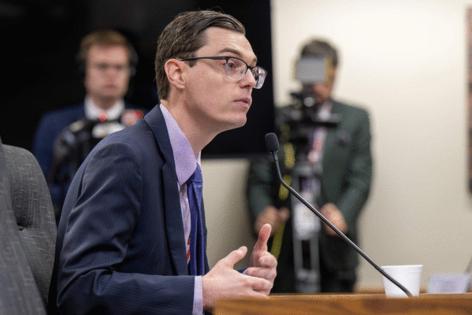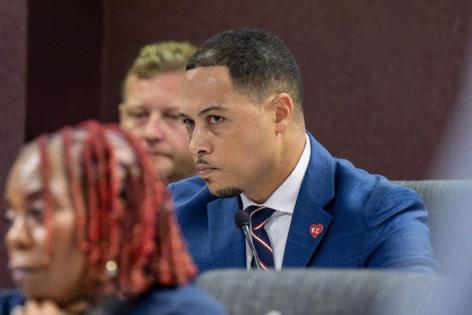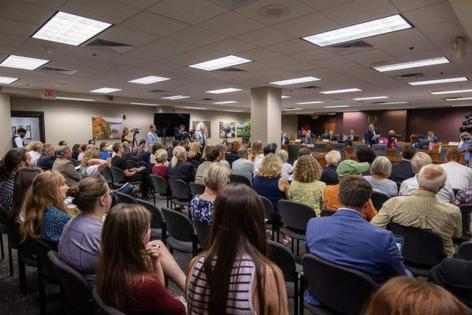Despite fiery opposition, Missouri Republicans advance gerrymandered map, direct democracy limits
Published in News & Features
JEFFERSON CITY, Mo. — Missouri Republican lawmakers late Thursday voted to advance a new, gerrymandered congressional map despite hours of fiery public testimony against the proposal.
Roughly an hour later, Republicans also advanced a plan that would weaken the state’s process for direct democracy.
Both measures are poised to head to the floor of the Missouri House early next week as part of Republican Gov. Mike Kehoe’s special legislative session. The goal is to carve up the Kansas City area to allow a Republican to pick up another U.S. House seat and make it harder for voters to amend the state constitution.
Residents from Kansas City and across Missouri packed into committee rooms in the basement of the state Capitol Thursday afternoon for separate hearings on the two measures. The vast majority of public testimony opposed both.
The two issues, which are aimed at representative and direct democracy, set up what could be the most consequential special session in recent history, potentially altering the trajectory of Missouri for years.
“My city,” said Rep. Mark Sharp, a Kansas City Democrat, “Kansas City, hangs in the balance right here, right now. I can’t tell you how angry I am.”
The first hearing centered on the congressional map, sponsored by Rep. Dirk Deaton, a Noel Republican. The map would slice up the voters of Kansas City into three Republican-leaning districts under pressure from the Trump administration.
Kehoe and Republican lawmakers hope to push out U.S. Rep. Emanuel Cleaver, Kansas City’s longtime Democratic congressman, and allow a Republican to pick up his 5th Congressional District seat. That effort could give Republicans control of seven of the state’s eight districts.
The mid-decade effort is exceptionally rare. Congressional districts are typically only redrawn once every decade based on data from the U.S. Census Bureau.
Deaton sidestepped that argument on Thursday and touted the map as a better version of the state’s current congressional districts, which were approved in 2022. He also skirted questions about whether President Donald Trump had pushed for the map, claiming that he personally had asked Kehoe for a new map.
“It is an improvement,” Deaton said, referring to the proposed map. “It is a reform of our current congressional map and it’s one that will put Missouri first and is a superior map than the one we have today.”
Deaton came under blistering questioning from Democrats on the House Special Committee on Redistricting. They questioned why lawmakers had not seen more concise demographic data and why Republicans wanted to dice up the state’s districts.
“This map is challenging the rights of Black and brown people like me and others — their right to vote,” Rep. Yolanda Young, a Kansas City Democrat, told Deaton. “Missouri is attempting to challenge the right and the power of the people, their voice, their vote and the protection of their rights against discrimination.”
One by one, residents from across Missouri walked up to the microphone and also expressed their opposition to the proposed map.
“Kansas Citians don’t like the map because it divides us,” said Kristen Ellis Johnson, an attorney from Kansas City. “Kansas City urban voters deserve an actual voice in D.C. and this illegal gerrymandering solely for the purpose of taking a historically blue seat and turning it red would take away that voice.”
After hearing six hours of debate, the committee voted 10 to 4 to advance the map to the full House. If approved by the chamber next week, the map will head to the state Senate.
Direct democracy overhaul
Down the hall in the basement of the Missouri Capitol, lawmakers also began discussing legislation that would overhaul the state’s initiative petition process.
The more-than-a-century-old mechanism for direct democracy has allowed voters of both parties to put measures to a statewide vote, including abortion rights and a higher minimum wage.
Currently, citizen-led ballot measures need a simple majority (50% of the vote plus one) in order to pass.
Kehoe, Republican lawmakers and some supporters, such as the Missouri Farm Bureau and the Missouri Restaurant Association, want to change the process to require that statewide ballot measures receive both majority support statewide and a majority in each of the state’s eight congressional districts to pass.
“We are allowing out-of-state interest groups with large buckets of money to put ballot measures on with slick campaigns that are not allowing the voices of our people to be heard,” said Rep. Ed Lewis, a Moberly Republican who sponsored the legislation.
Lewis argued that residents living in the rural, less populated areas of the state do not have enough sway on statewide ballot measures. He added that recently passed ballot measures have been “controversial and partisan.”
“To change the constitution of the state, there should be broad statewide support,” Lewis said. “And, I would submit, broad geographic support across the state.”
Democrats on the House Elections Committee immediately pushed back, including Rep. Eric Woods, a Kansas City Democrat. He referenced the gerrymandering effort being discussed on the other side of the Capitol basement.
“If your concern is that certain under-populated or rural parts of the state don’t have a voice,” Woods said, “how does that argument fly when we’re about to pass the map that draws downtown Kansas City to rural Webster County, over 200 miles away?”
Other opponents framed the move as an attack on direct democracy, emphasizing that the proposal would make it virtually impossible for any citizen-led ballot measure to pass.
Others pointed to the fact that the higher threshold would only apply to citizen-initiated measures. Constitutional amendments proposed by state lawmakers would still only require a simple majority to pass.
“By requiring majority in all eight congressional districts, this will effectively end the citizen initiative process in Missouri, which has really been a shining example across the country of the ability of citizens to be heard,” said Denise Lieberman, director of the Missouri Voter Protection Coalition, a voting rights group.
Despite the opposition, the committee voted 10 to 5 to advance the legislation. If approved by both chambers, the proposed constitutional amendment would still have to be approved by voters on a future ballot measure.
Lewis’ legislation also includes several additional changes to the initiative petition process, such as a ban on foreign adversaries from contributing to or opposing ballot measures. Democrats have derided the addition as “ballot candy,” intended to entice voters to approve the measure.
The dueling, hourslong hearings on Thursday offered a preview of the upcoming floor debates, which will take shape in the House and Senate over the next week.
Both pieces of legislation are expected to head to the House Rules Committee on Friday morning, where lawmakers will decide when to schedule the debate on the House floor.
_____
©2025 The Kansas City Star. Visit kansascity.com. Distributed by Tribune Content Agency, LLC.












Comments